Becoming a surrogate is a rewarding and life-changing decision, but there are specific requirements and health considerations to ensure that both the surrogate and the baby are safe throughout the pregnancy. Certain medical, legal, and personal factors can disqualify someone from being a surrogate. In this article, we’ll go over the common reasons that might disqualify you from becoming a surrogate.
1. Age Restrictions (How to Become a Surrogate Mother in Houston: Requirements & Steps)
- Common Age Range: Most surrogacy agencies have an age requirement for surrogates, typically between 21 and 40 years old.
- Why Age Matters: Women in this age range are generally in the best health to carry a pregnancy. Women younger than 21 or older than 40 may face higher health risks during pregnancy, which can increase complications for both the surrogate and the baby.
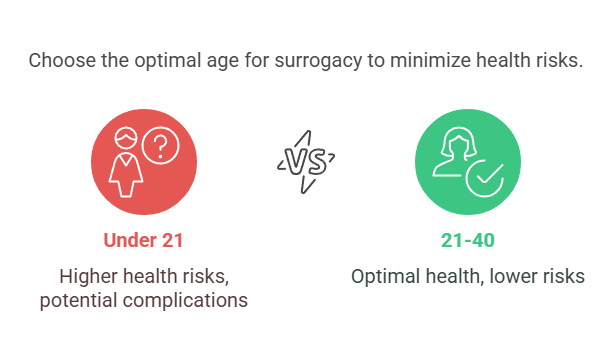
2. Health Conditions
Your overall health is crucial when being considered as a surrogate. Certain medical conditions can disqualify you, as they could put both your health and the baby’s health at risk.
- Chronic Illnesses: Conditions like diabetes, high blood pressure, autoimmune diseases, or any condition that could complicate pregnancy.
- Obesity: If a surrogate is overweight or obese (a BMI over 30), it can increase risks during pregnancy and delivery, including gestational diabetes, preeclampsia, and premature birth.(BMI Calculator)
- Heart Conditions: Any heart disease or condition that could impact a woman’s ability to carry a pregnancy to term is a disqualifier.
- Mental Health: Active mental health disorders that are untreated, such as severe depression or anxiety, can also disqualify you from becoming a surrogate. Emotional well-being is critical throughout the surrogacy process.
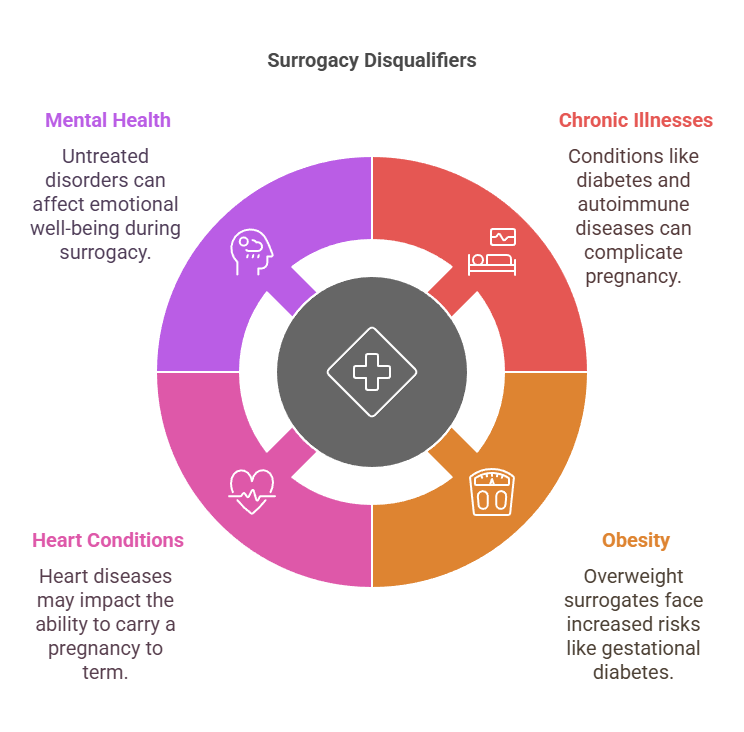
3. Previous Pregnancy Complications
- Complications in Past Pregnancies: If you have had complications during past pregnancies, such as preterm labor, gestational diabetes, eclampsia, or miscarriages, some surrogacy agencies may require a more in-depth evaluation before accepting you as a surrogate.
- History of Cesarean Sections: While having a cesarean section (C-section) does not automatically disqualify you, multiple C-sections may increase the risks associated with carrying a pregnancy, including complications during delivery.
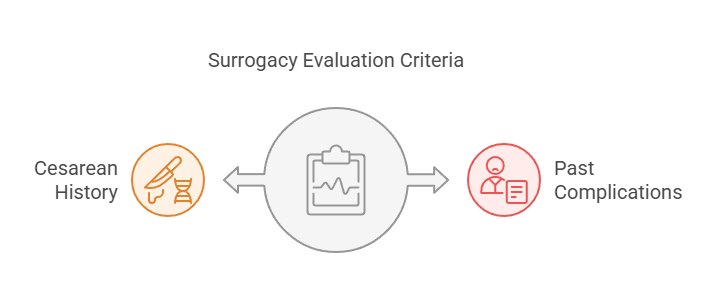
4. Smoking, Drug, or Alcohol Use
- Smoking: Smoking is harmful during pregnancy and can affect both the surrogate’s and baby’s health. If you smoke, you will likely be disqualified from being a surrogate.
- Substance Abuse: Any history of drug abuse or alcohol consumption that could affect the pregnancy or harm the baby is an automatic disqualifier. Surrogacy agencies may require drug testing as part of the medical screening process.
5. Inability to Pass Medical Screenings
Surrogates undergo rigorous medical and psychological screenings to ensure that they are fit for the physical and emotional demands of pregnancy. If a potential surrogate cannot pass these screenings, they may be disqualified.
- Medical Screening: This includes tests for sexually transmitted infections (STIs), hormone levels, reproductive health, and general physical health.
- Psychological Screening: Mental and emotional readiness is vital for surrogates. Women who are not emotionally prepared or who have a history of untreated mental health issues may not be suitable for surrogacy.
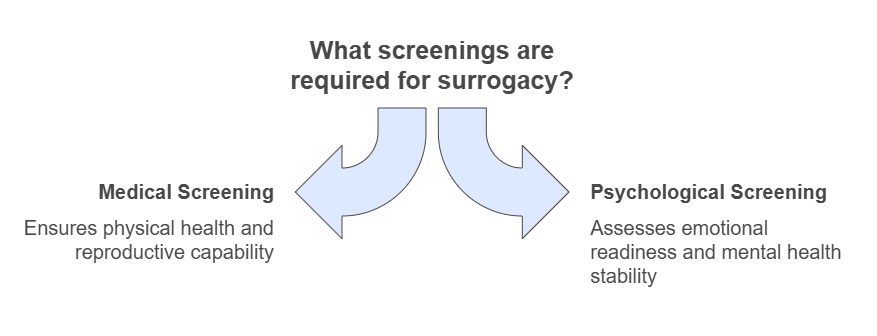
6. No Prior Successful Pregnancies(Health and Wellness Tips for a Successful Surrogacy Journey)
Most surrogacy agencies require that the surrogate has had at least one previous successful pregnancy (preferably with no major complications). This is important because it shows that the woman is capable of carrying a pregnancy to term and understands the physical and emotional demands of being pregnant.
7. Legal and Contractual Issues
- Unwillingness to Sign a Surrogacy Contract: A surrogate must be willing to sign a legally binding contract that outlines the terms and responsibilities of the surrogacy process. If a potential surrogate is not comfortable with the legal aspects, they may be disqualified.
- Legal Issues: Surrogates must also be legally eligible to participate in surrogacy. This can include being a legal resident in the country or state where the surrogacy is being performed.
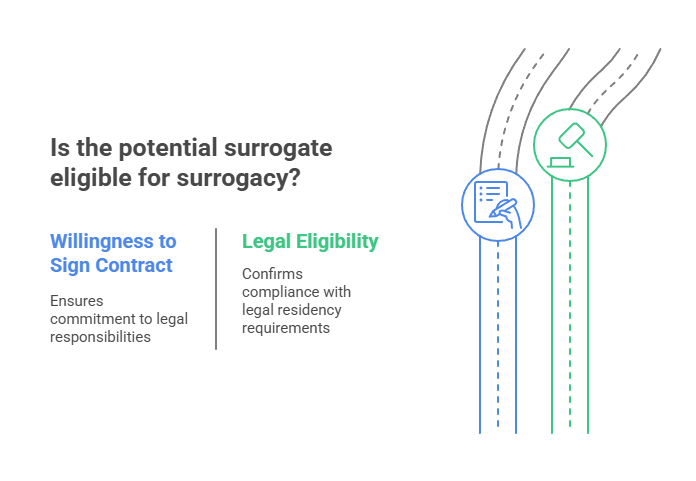
8. Financial or Personal Instability
Surrogacy is a long-term commitment, and surrogates must be financially stable and capable of managing the financial and personal responsibilities associated with the process. Women who are experiencing significant financial instability or personal issues (e.g., unstable housing or relationship problems) may not be considered suitable candidates.
9. Previous History with Surrogacy
- Complications in Prior Surrogacies: If you have been a surrogate before but faced complications, especially those that involved medical, emotional, or legal challenges, it may impact your eligibility for future surrogacies.
- Lack of Support: If you are unable to provide adequate support to your own well-being, your family’s well-being, or your emotional needs, surrogacy may not be a good option.
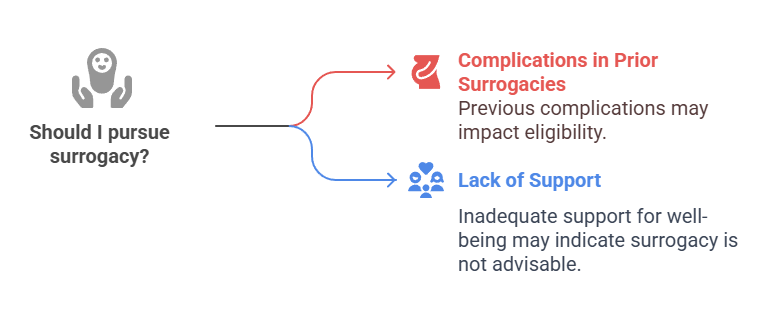
10. Age of the Intended Parents (if applicable)
In some cases, intended parents may have preferences or requirements based on age, such as only wanting younger surrogates. While this is not a common disqualifier, it may apply in certain situations.
Conclusion: Are You a Good Candidate for Surrogacy?
Becoming a surrogate is a beautiful and life-changing decision. However, it’s essential to ensure that you meet the physical, emotional, and legal requirements to ensure a successful and safe surrogacy experience. Medical and psychological evaluations, as well as understanding the emotional commitment, are all necessary steps before becoming a surrogate.
If you are interested in becoming a surrogate, it’s important to work with a reputable surrogacy agency that can guide you through the process, provide medical evaluations, and ensure that you are fully prepared for the journey ahead.
Feel free to reach out if you have more questions or if you want to know more about the surrogacy process. You could be helping a family grow in a life-changing way!




